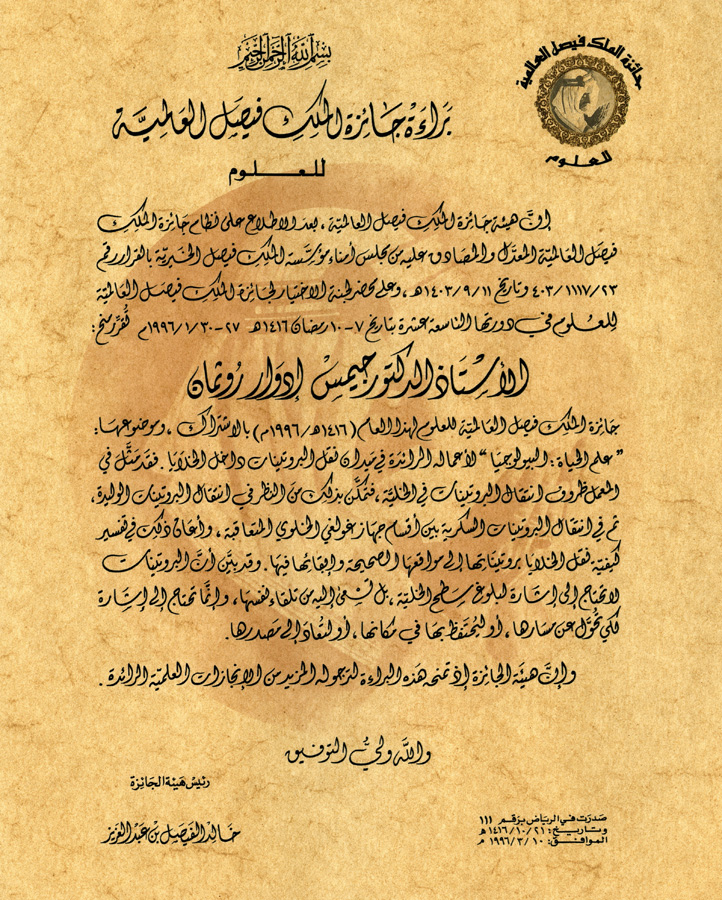

Professor James E. Rothman
King Faisal Prize in Science 1996 Laureate
Topic: "Biology"
I will never forget the singular moment in 1979 when we first succeeded in reproducing transport in a cell-free test tube system

James Rothman received his B.A. (summa cum laude) from Yale College, and a Ph.D. in Biological Chemistry from Harvard Medical School, followed by a two-year postdoctoral fellowship in biology at Massachusetts Institute of Technology. He started his academic and research career at Stanford University in 1976, and rose to full professorship in Biochemistry within 6 years. In 1988, he assumed the E.R. Squibb Chair of Molecular Biology at Princeton University. In 1991, he became the Paul A. Mark Professor and a Chairman of the Cellular Biochemistry and Biophysics Program at the Sloan-Kettering Institute in New York and a Vice-Chairman of the Institute.
Professor Rothman made the brilliant discovery that intracellular protein transport could be reconstituted in cell-free extracts and that vesicular transport within the Golgi apparatus could be reproduced accurately from isolated Golgi membranes, cytosol and ATP. This discovery had a profound impact on our understanding of intracellular secretory pathways, and particularly how these transport vesicles reach their correct destination in the cell and how and when to release their contents. Rothman’s dissection of a cell dynamic event as complex as this in vitro in individual steps is a milestone in biomedicine and has opened new fields in cell biology.
Professor Rothman’s distinguished research appeared in hundreds of scientific papers and invited lectures. He received numerous awards and honors for his accomplishments, including an Honorary Doctorate degree from Regensburg University. He is a Fellow of the US Academy of Sciences and Arts, a Member of the US National Science Academy, and its Medical Institute, and a Foreign Associate of the European Organization for Molecular Biology. He also served as a member of the editorial boards of several scientific journals, including Science and Cell, and President of the Gordon Conference on Molecular Membrane Biology.
This biography was written in the year the prize was awarded.
- He held many positions including:
- Senior Editor of the Clinical Investigation Journal in 2002.
- Director of the Biological Chemistry Laboratory at Columbia University in 2004.
- Professor of Physiology and Cell Physics at Columbia University in 2004.
- The Clyde and Helen Hu Chair of Biological Chemistry and Director of the Genome Center at Columbia University in 2005.
- The Fergus F. Wallace Professor of Biomedical Sciences at Yale University in 2008.
- Chairman of the Department of Cell Biology at Yale University Medical School in 2008.
- He received many awards and honors including:
- Harden Medal from the British Biochemical Society in 1997.
- Honorary Doctorate from the University of Geneva in 1997.
- Otto-Warburg Medal from the German Society of Biochemistry and Molecular Biology in 2001.
- Louisa Gross Horwitz Prize in 2002.
- Albert Lasker Basic Medical Research Award in 2002.
- Honorary Membership of the Japanese Biochemical Society in 2005.
- Fellowship of the American Society for Cell Biology in 2010.


